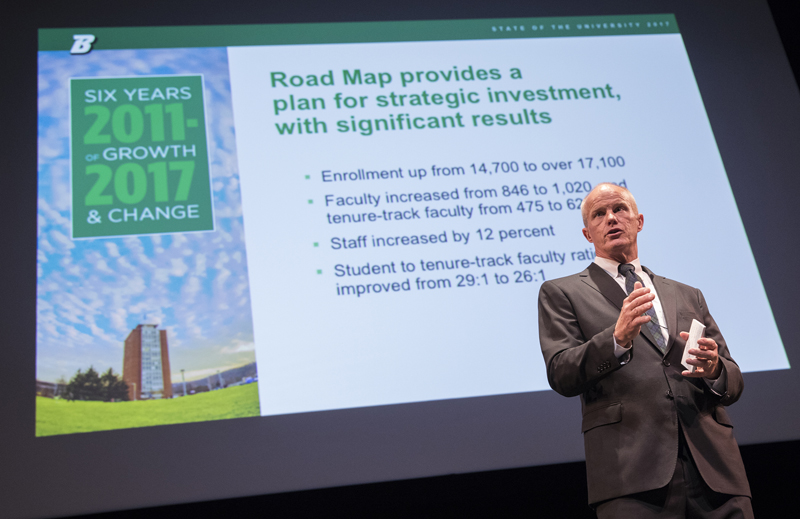Stenger unveils University initiatives
State of the University address features details on Road Map projects

Developing a College of Nursing and Health Sciences, establishing postdoctoral diversity fellowships, starting a Health Sciences Core Facility and emphasizing data science are among Binghamton University’s proposed 2017-18 initiatives.
“We had 311 volunteers – faculty, staff, students, community members, alumni – who spent six months talking about big ideas and preparing (Road Map) proposals,” President Harvey Stenger said at his State of the University address on Sept. 7. “We decided to choose four of the more than 60 proposals submitted.”
Stenger discussed the University’s priorities and strategies during a 40-minute talk to administrators, faculty, staff, students and community officials at the Osterhout Concert Theater in the Anderson Center.
The College of Nursing and Health Sciences will add new academic and clinical programs, as the Decker School facilities are relocated to Johnson City adjacent to the School of Pharmacy and Pharmaceutical Sciences. New programs could include occupational therapy, physical therapy, audiology and nutrition.
“Expanding the curriculum of offerings at the school into new, allied health (fields) is going to be a high priority,” Stenger said.
The college will also expand its community outreach, as clinical nurse practitioners will serve in a newly purchased building on Jennison Avenue in Johnson City.
“We will have opportunities once we are in the village setting to have a stronger outreach program for the people who are inside the college and school,” Stenger said.
The Health Sciences Core Facility, meanwhile, will provide advanced, sophisticated equipment for researchers and educators. The facility will also foster partnerships with industry and healthcare, while attracting outstanding faculty and students, Stenger said.
“The fastest growing area of research in the United States is health sciences,” he said. “We are significantly behind. We have great programs in psychology, biochemistry, chemistry and biology, but we are lacking the kinds of facilities and equipment that our competitors have.”
The data science initiative will provide the University with high-performance, data-intensive computing resources.
“It’s the right time for us to enter this field,” Stenger said. “Data science — or ‘big data ’— has been around for five or six years, but it’s been within the domain of the computer science and mathematical programs. We will put together a holistic approach to data science. … There are opportunities (in places) where you don’t have data science that we will try to populate with new faculty over the next several years.”
Attracting and recruiting diverse and underrepresented faculty is a challenge in a competitive field of PhD graduates. The Presidential Diversity Postdoctoral Fellowships will allow Binghamton University to better recruit highly qualified candidates.
“We decided that perhaps the best way is take our own PhD students and keep them — allow them to stay here and get their postdoctoral work done,” Stenger said. “We will create a fund available mostly to those departments and programs where recruiting underrepresented faculty is more difficult. We’ll try to help improve the diversity of those programs. Then it will trickle down to improve the diversity of the students and staff in those programs, as well.”
The four main University initiatives will each feature two co-chairs and a project manager to move the proposals forward, Stenger said.
The Road Map Steering Committee also identified 10 ideas that will be advanced using divisional resources. They are:
• The establishment of a High-Impact Learning Innovations Council.
• Resources to support the recruitment of new hires and retention of experienced personnel.
• Community outreach to enhance the appeal of downtown Binghamton living for faculty, staff, students and community members.
• A Center for Interprofessional Education and Research that brings together students from pharmacy, nursing and social work.
• A global initiatives project focused on making Binghamton a preferred destination for international students.
• An enhanced technologies infrastructure.
• A Digital Commons and Innovation Lab.
• A Social Sciences Experimental Suite.
• Renovations to the Glenn G. Bartle Library.
• A University Conference and Welcome Center.
In the spirit of the Road Map process, Stenger stressed continued collaboration on the 2017-18 projects.
“What we need now is your feedback,” he said, asking audience members to go to binghamton.edu/sobu2017 to share comments. “We need you to tell us what you like and what you don’t like. I’d love to hear your suggestions about the things we talked about today.”

